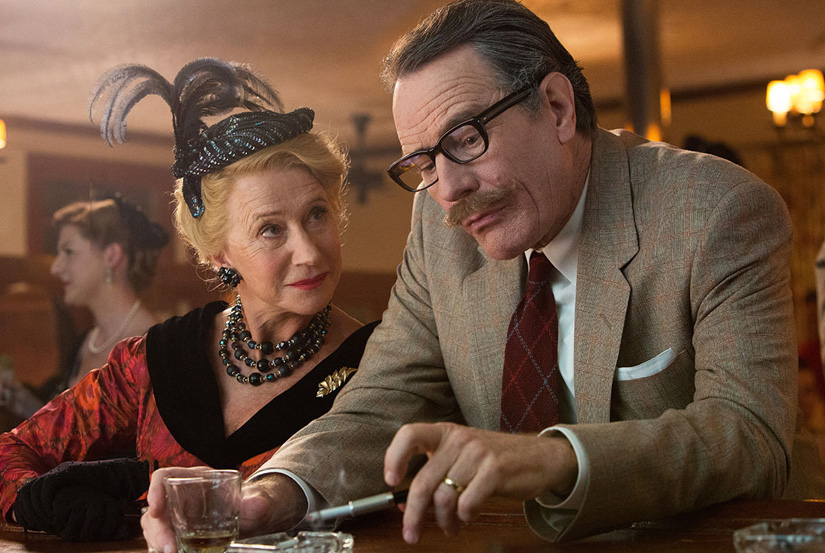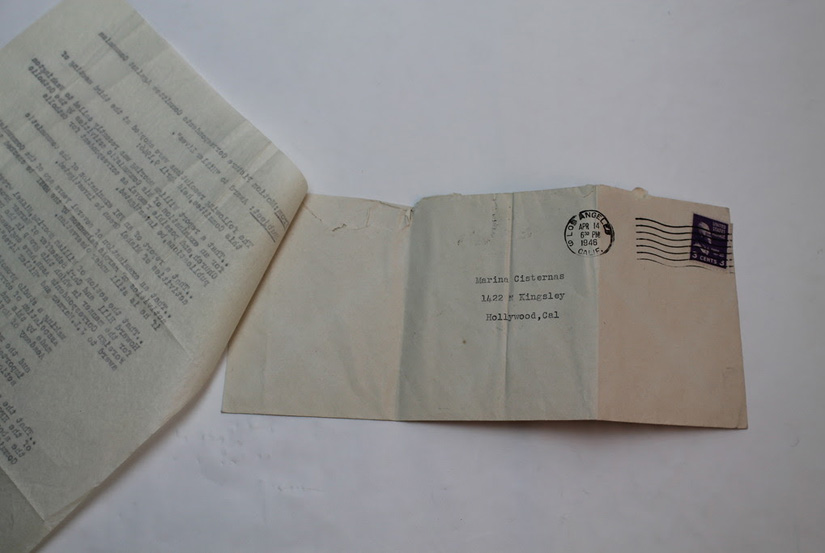
- HFPA
Trumbo, the Blacklist and the HFPA
The biographical drama Trumbo about blacklisted screenwriter Dalton Trumbo received two Golden Globes nominations in 2015: Bryan Cranston for his portrayal of Trumbo, the highest-paid screenwriter of his day, and Helen Mirren for her role as Trumbo’s nemesis, Hollywood actress turned gossip columnist Hedda Hopper.
The red scare that stalked America and most visibly Hollywood after the end of the Second World War was one of the most shameful chapters in the history of the United States. Its impact was felt strongly in the entertainment industry at the time. And just as the movie Trumbo comes to remind us of that period, a recently discovered document (see below) sheds light on how the Hollywood Foreign Press Association was also swept up in the controversy that roiled the nation and the movie industry.

In late 1947 The U.S. Congress established the House Un-American Activities Committee (HUAC) to investigate allegations of communist infiltration of Hollywood. It held hearings and called witnesses attempting to identify political subversives among movie industry actors, writers, and directors.
Some in Hollywood, mostly actors and writers (Dalton Trumbo was just one), opposed the HUAC at great risk to their careers, but others supported it. Hollywood was split. The newly formed Hollywood Foreign Correspondents Association, (as the HFPA was known then) sided with the HUAC and its Hollywood supporters. We have a very scant archive of our early days, but a letter recently surfaced in an estate sale, offered on eBay and added to the HFPA archives. Signed by then-president Marina Cisternas, it revealed the deep schism in the group, the internal rage and the anti-communist frenzy mirroring the world around the fledgling organization.
President Cisternas, who came up with the idea and design of the Golden Globe statuette we still use 70 years later, was a journalist who also dabbled in acting, wrote two historical romance novels, and was the HFCA’s own red hunting Hedda Hopper, down to wearing signature flamboyant oversized hats.
In early 1946 Cisternas formed a ‘Motion Picture Correspondents Committee against Communism’, trying to root out and ‘force the resignation of” members who had been accused of being “subversive”. Five members were targeted, among them William H. Mooring, who was the first president of the organization. His sterling anti-communist credentials did not help. Mooring was a former British newsman, a supporter of the Catholic National Legion of Decency, the Motion Pictures Producers Code of censorship and, of course, the communist hunt. In his column, syndicated in Catholic and general newspapers in the USA, Canada and elsewhere, he vehemently waged the anti-communist crusade.
He would later warn of ‘… the infiltration of foreign movie studios by atheistic Communists … (with) a European Communist plan to ‘soften up’ America (morally)’. He saw movies thru the prism of anti-communism. For example, reviewing the populist comedy Born Yesterday, where journalist William Holden teaches Judy Holliday’s character about democracy and gives her a tour of Washington D.C.’s iconic sites, Mooring wrote in his syndicated column: ‘Never have human symbols been more subtly molded to carry destructive comment through disarming comedy … a clever film satire strictly from (Karl) Marx’. (Holliday, who later won an Oscar for her starring role, was listed in the anti-Communist publication Red Channels as a member of organizations charged as fronts for the Communist Party.)
And yet, in the fervid world of the red scare, even Mooring was suspect. The HFPA’s internal committee wanted to know why he ‘was called to Washington for an examination of his communistic (sic) activities’ by his employer, the Catholic Church. Another founding member, Mishel Green, was suspect because he was ‘examined several years ago of (sic) Communist activities by the F.B.I.’.
More specifically, the committee accused all five targeted members of conspiring to give an award to Warner Bros Studios over the objections of one opposing member, praised for ‘his courage in leading the fight against the Communistic (sic) group in the Hollywood Foreign Correspondents Association’. The five were accused of having ‘engineered, without a vote, an award to J.L. Warner and ‘Hitler Lives‘, ‘That film was a short documentary made by Warner Bros and released at the last week of 1945. It was directed by (an uncredited) Don Siegel and based on a film produced by Frank Capra’s Army unit and written by Theodore Geisel (Dr. Seuss), just before the victory over Germany. Meant to prepare the American troops to deal with the defeated Germans, the film warns that Germany still contains Nazi supporters and that the world must stay ever vigilant against the prospect that a new Hitler will arise within Germany. Jack Warner obtained the rights, quickly produced Hitler Lives? and won the Oscar for Best Documentary Short Subject at the 18th Academy Awards, March 7, 1946.
The HFCA’s Communist hunters opposed the move by the five members to give the association’s own award to Hitler Lives and Jack Warner at a luncheon on April 23, 1946, at the Beverly Hills Hotel. The stated reason was that ‘making a studio promotion of awards by any association of correspondents cheapens those made by this and other groups, including the Academy …’. Did the HFCA’s ‘Correspondents Committee against Communism’ worry about award competition, or was their real concern about the movie ending with a warning against the danger of the rise of fascism in America, while they saw communism as the primary and imminent danger? We will never know. But they did resolve …’ that J.L. Warner be urged not to accept an award made under these circumstances, as being inconsistent with his high standing as a motion picture producer, and head of Warner Bros Studio, with its high reputation’.
We also do not know if Warner agreed, and if the award luncheon took place. But the Golden Globes Awards, featuring the newly minted golden statuette, grew in scope and importance. Incidentally, in 1960 Spartacus was released as recounted again in Trumbo – it was the film for which producer/star Kirk Douglas famously broke the Hollywood blacklist by crediting Dalton Trumbo as screenwriter. The HFPA honored the film with six nominations that year; it won the Globe for Best Motion Picture Drama. That sane year director Otto Preminger also broke the ban on
Trumbo hiring him to write the script for Leon Uris’s blockbuster Exodus and defiantly giving him credit. In 1961 the HFPA recognized Exodus with three Golden Globe nominations and one win: Sal Mineo as Best Supporting Actor, Drama.
The Witch Hunt was indeed over.
PS: Mitzi Trumbo, Dalton Trumbo’s daughter, sent us her comments via email:
‘That’s good. Preminger announced – it should be famously – on the front page of the NY Times (Jan. 1960) that he was crediting my father for the screenplay of Exodus. Douglas announced several months later. Douglas has claimed credit for ‘breaking the blacklist’ and my mother, brother, and I have tried to get the facts out for the last 30 years. The truth is that the blacklist was broken for my father, but not for countless others, whose careers, marriages, and sometimes lives were destroyed and never recovered. The blacklist petered out, leaving many victims in its wake.

